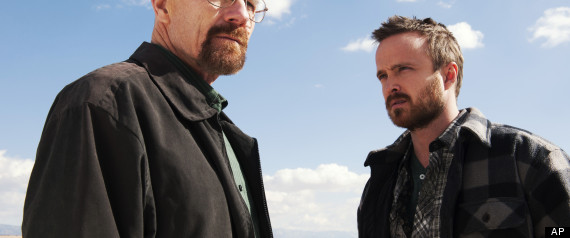
Breaking Bad is but a few episodes from completion and it's hard to say anything about it that has not been said, but I bravely intend to do so anyhow. In recent weeks, there has been much discussion of the lack of strong female characters (which I personally think does the show a bit of a disservice), but not enough has been made of the show's persistent and fierce criticism of masculinity that has permeated the show throughout the five-season run.
Walter White's descent (or ascent depending on how you view it) from a justifiable anti-hero to a loathsome villain has been gradual. Vince Gilligan described the character's transformation as "protagonist to antagonist," and when we first meet Walter as the protagonist, he has lived a life forever repressed and stripped of the limited power available to him. His family affairs up until this point have been predominantly controlled by Skyler, he teaches chemistry to a largely indifferent group of teenagers and his brother-in-law Hank represents a clichéd hyper-masculinity that serves to diminish Walt's already lowly status further. So when he finds an area in which he can assert dominance and power, his ego grows exponentially. The decreased empathy that we feel for Walt runs in tandem with his acts being less about selflessness or basic self preservation and infinitely more to do with retaining power in an industry in which callousness and violence are pre-requisites. Walt becomes obsessed with his manhood, even going as far as to purchase a car wash in order to spite the owner for a perceived slight that occurred some time beforehand. The zenith of Walt's egomania is perhaps typified with the memorable "say my name" scene. This scene exemplifies the transformation from the timidity and nervousness of Walter White into the arrogance and ruthlessness of Heisenberg; the conversion from protagonist to antagonist is complete.
Hank's character starts life as a stereotype of masculinity, a jock. He subscribes to a largely outmoded but still prevalent criteria of what it means to be a man. At family gatherings, he frequently takes the time to emasculate Walt and assert a dominance within the family that had previously gone unchallenged in Walt's pre-Heisenberg days. However, as the show develops, the characters develop as well, and before long, Hank becomes much more than a caricature, but rather a rounded, three-dimensional character. Perhaps more than any other character in the show, Hank is obsessed with the projection of masculinity; from his home-brewed Schraderbrau to his job at the DEA, he seeks to emanate a brashness and confidence. However, rooted in his masculinity are deep-seated insecurities and anxiety attacks that impede his judgement. Hank's sense of himself is almost completely based around basic tenants of what he views to be essential to being a male. His own masculinity is perhaps at its most destructive when refusing money for treatment that would enable him to walk again, which echoes Walt's own refusal of monetary help for his cancer treatment from his former business partner. Masculinity in these instances is associated with a detrimental desire to be self-sufficient. Indeed, had Walt swallowed his pride at this early stage, then he would have saved everyone a lot of bother.
Jesse is by far the most tragic character in Breaking Bad. The initial projection of youthful overconfidence and independence gives way to a lost boy desperately in need of the father-figure that has been sorely absent in his turbulent life. At different stages of the plot, he comes to see Walt and Mike as paternal figures, but it's his persistent reference to Walt as Mr. White that gives an indication of the perverse and manipulative relationship between the two. It is no coincidence that the character that seems most troubled with the morality of his actions is also the character that has long eschewed the façade of masculinity. Jesse is also one of the few male characters that seems willing to discuss his feelings and not act with the apparent indifference or stoicism of which Hank and Walt are both guilty.
As the series hurtles to a close, it is becoming very apparent that its creators seek to portray male pride as a destructive influence. The large yet fragile egos of all of the male characters at some point or another leads to miscalculations or seemingly needlessly vindictive acts. Time and again, the damaged pride and vanity of the male characters cause them to act without logic and -- at their most destructive -- extreme violence. Between Walt's angry desire to be a "pursuer rather than pursued" and Hank's desperate need to create the illusion of self-sufficiency, it becomes clear that masculinity is twinned with the wholly negative traits of the male characters within the show.